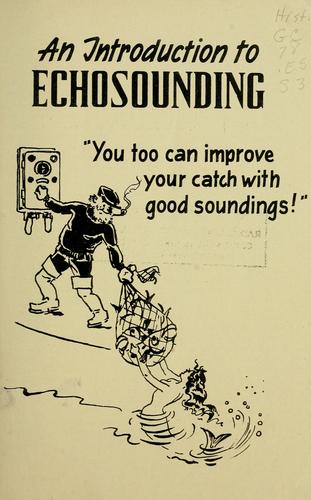Explore: *underwater Sound
Discover books, insights, and more — all in one place.
Learn more about *underwater Sound with top reads curated from trusted sources — all in one place.
AI-Generated Overview About “%2Bunderwater-sound”:
Books Results
Source: The Open Library
The Open Library Search Results
Search results from The Open Library
1An introduction to echosounding
By Joachim Eduard Schärfe

“An introduction to echosounding” Metadata:
- Title: ➤ An introduction to echosounding
- Author: Joachim Eduard Schärfe
- Language: English
- Number of Pages: Median: 126
- Publisher: ELAC Electroacustic GmbH
- Publish Date: 1955
- Publish Location: Kiel, Germany
“An introduction to echosounding” Subjects and Themes:
- Subjects: ➤ sound - fishing - underwater sound - Echo sounding - audio technology - Underwater acoustics
Edition Identifiers:
- The Open Library ID: OL6205050M
- Online Computer Library Center (OCLC) ID: 6476115
- Library of Congress Control Number (LCCN): 56018478
Access and General Info:
- First Year Published: 1955
- Is Full Text Available: Yes
- Is The Book Public: No
- Access Status: Borrowable
Online Access
Downloads Are Not Available:
The book is not public therefore the download links will not allow the download of the entire book, however, borrowing the book online is available.
Online Borrowing:
- Borrowing from Open Library: Borrowing link
- Borrowing from Archive.org: Borrowing link
Online Marketplaces
Find An introduction to echosounding at online marketplaces:
- Amazon: Audiable, Kindle and printed editions.
- Ebay: New & used books.
2Underwater sound radiation from single large raindrops at terminal velocity; the effects of asloped water surface at impact
By Glenn A. Miller

“Underwater sound radiation from single large raindrops at terminal velocity; the effects of asloped water surface at impact” Metadata:
- Title: ➤ Underwater sound radiation from single large raindrops at terminal velocity; the effects of asloped water surface at impact
- Author: Glenn A. Miller
- Language: English
- Number of Pages: Median: 44
- Publisher: ➤ Naval Postgraduate School - Available from National Technical Information Service
- Publish Date: 1992
- Publish Location: ➤ Springfield, Va - Monterey, Calif
“Underwater sound radiation from single large raindrops at terminal velocity; the effects of asloped water surface at impact” Subjects and Themes:
- Subjects: RAINDROPS - BUBBLES - WATER JETS - UNDERWATER SOUND
Edition Identifiers:
- The Open Library ID: OL25504343M
Access and General Info:
- First Year Published: 1992
- Is Full Text Available: Yes
- Is The Book Public: Yes
- Access Status: Public
Online Access
Online Borrowing:
- Borrowing from Open Library: Borrowing link
- Borrowing from Archive.org: Borrowing link
Online Marketplaces
Find Underwater sound radiation from single large raindrops at terminal velocity; the effects of asloped water surface at impact at online marketplaces:
- Amazon: Audiable, Kindle and printed editions.
- Ebay: New & used books.
Wiki
Source: Wikipedia
Wikipedia Results
Search Results from Wikipedia
Naval Undersea Warfare Center
was the Underwater Ordnance Station, and then the Underwater Weapons Research and Engineering Station until 1970. That year, the Underwater Sound Laboratory
Underwater acoustics
Underwater acoustics (also known as hydroacoustics) is the study of the propagation of sound in water and the interaction of the mechanical waves that
SOFAR channel
Worzel hung a hydrophone from Saluda, a sailing vessel assigned to the Underwater Sound Laboratory, with a second ship setting off explosive charges up to
Sonar
Sonar (sound navigation and ranging or sonic navigation and ranging) is a technique that uses sound propagation (usually underwater, as in submarine navigation)
JASCO Applied Sciences
completed in June 2020. The firm deploys calibrated sound recorders to measure underwater sound levels. Projects may be long-term, wide-area acoustic
Bloop
high-amplitude underwater sound detected by the U.S. National Oceanic and Atmospheric Administration (NOAA) in 1997. By 2012, earlier speculation that the sound originated
Operation Wigwam
of over 12,000 miles (20,000 km). The sound signals provided one of the early measurements of underwater sound attenuation at low frequencies. The detonations
Hydrophone
ὕδωρ + φωνή, lit. 'water + sound') is a microphone designed for underwater use, for recording or listening to underwater sound. Most hydrophones contain
Upsweep
in August 1991, using the Pacific Marine Environmental Laboratory's underwater sound surveillance system, SOSUS, and is loud enough to be detected throughout
List of unexplained sounds
Scientists/researchers of NOAA speculate the sound to be underwater volcanic activity. The Upsweep's level of sound (volume) has been declining since 1991,